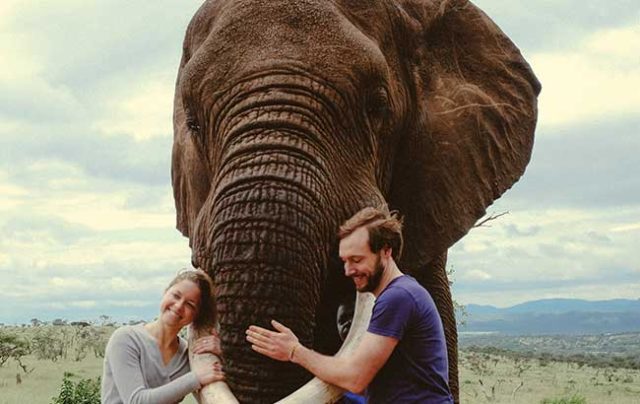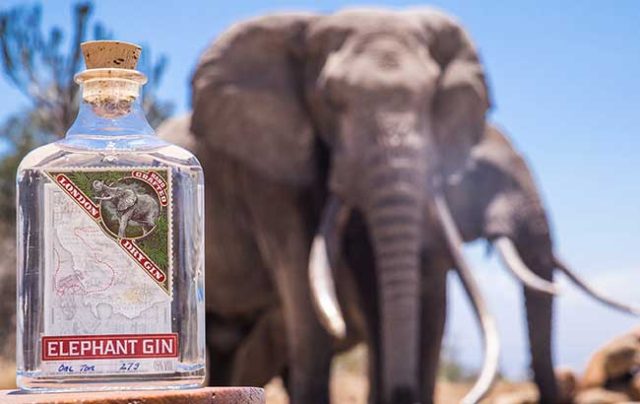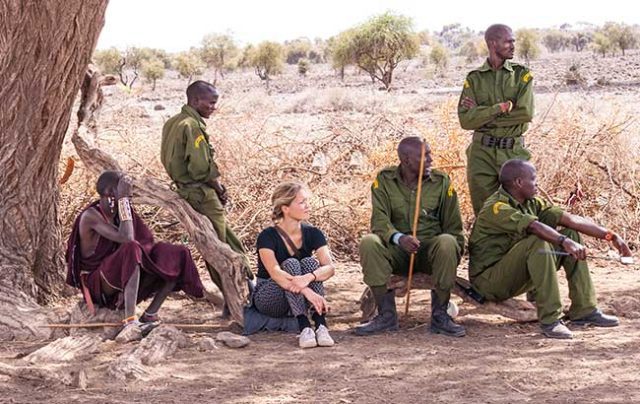This website uses cookies so that we can provide you with the best user experience possible. Cookie information is stored in your browser and performs functions such as recognising you when you return to our website and helping our team to understand which sections of the website you find most interesting and useful.
The big interview: Elephant Gin
By Melita KielyCouple Tessa and Robin Gerlach have combined their love of conservation with a passion for distilling. The result is Elephant Gin, a brand that is making a big difference in Africa.

An elephant is killed every 15 minutes. This statistic stuck in the minds of Tessa Gerlach and her husband, Robin Gerlach, as they travelled in South Africa, Tanzania, and Kenya for work, Tessa as a filmmaker and Robin an accountant.
Feeling compelled to help, the pair connected with local conservation projects that work to protect elephants for future generations.
But working in conservation is far from glamorous.
The duo recalls sweltering days spent digging water holes – but small pleasures would come in the evenings with ‘sundowners’, usually in the form of a refreshing gin and tonic.
“That sundowner moment was something we relived when we were back in London,” says Tessa. “That idea of helping conservation work, coupled with the sundowner, and being able to bring those two worlds together to share with friends and people around Europe was the idea behind combining elephants and gin to make Elephant Gin.”
Hobby to business
What started as a hobby has grown into a fully‐fledged, international business that will celebrate its 10th anniversary in 2023.
“We started this project in 2011, then we sold our first bottle in September 2013,” Tessa remembers.
Since Elephant Gin’s inception, 15% of bottle profits have been donated to elephant‐conservation projects in Africa. Over the following two and a half years, Tessa and Robin realised there was potential to turn Elephant Gin into more than a hobby, and they decided to dedicate themselves to the brand full‐time in 2015.
Today, the brand is available in 25 countries and boasts a core range of four gins: Elephant London Dry Gin, Elephant Sloe Gin, Elephant Strength Gin, and Elephant Orange Cocoa Gin.
“We have our focus in Europe,” says Robin, “Germany, the UK, Italy, these are definitely our strong brand homes. And now we’re doing a little bit further overseas, in the US. In New Zealand and Australia, we are accelerating the brand’s growth.”
Elephant Gin’s existing 25 markets will continue to be the company’s core focus in the year ahead, “not because our ambition has slowed but we came from a strong bar community in London, and we want to be able to work with these incredible bartenders,” explains Robin.
“We still have growing to do in the markets we’re in,” Tessa adds. “Focusing on our core markets rather than trying to get everywhere quickly is much more important.”
To enhance the brand’s positioning in its existing markets, Elephant Gin welcomed James Le Grys to the team this year as sales director.
“One of the cool things he’s going to be involved in is what we call the ‘wildlife warrior programme’,” says Robin.
“This is where bars can really participate in conservation. By creating cocktails for conservation, it will allow them to make a difference and give back to these wildlife causes, so that’s something that will really be a big focus for us next year.”
In the first quarter of 2022, Elephant Gin surpassed €1 million (US$1m) in donations to support elephant conservation projects. By 2025, Tessa and Robin hope to have raised their second million.
But raising funds for conservation charities is not as straightforward as one might think. Tessa and Robin have found great support in bars as a platform for their fundraising efforts.
However, Tessa explains how additional donations from venues would require complex money trails in order to be legitimate and ensure donations reached their destined charities.
To make the process easier, in August The Elephant Gin Foundation was launched. Headquartered in London, the non‐profit organisation will be responsible for managing the distribution of funds, and work to preserve elephant habitats.
“With this foundation, we can now do fundraising, we can do wider campaigns and encourage people to donate directly to the foundation,” Tessa explains, adding that the foundation has five trustees.
“We also have the opportunity for other foundations to apply for a grant then make decisions on the best possible elephant conservation projects.”
Strict guidelines
Tessa is very hands‐on in ensuring the money raised through Elephant Gin, and now through the foundation, will go to the right projects and have maximum impact.
“We don’t just feed money into a black hole and it disappears,” she assures. “We have very strict guidelines and what we prefer is giving funds to a project that has a beginning and an end. So, for example, we will be the sole funder of a project, say, building an education centre in South Africa, and once that’s been built and we set it up to fund itself, we’re off.”
One project Elephant Gin does continuously fund is 55 anti‐poaching rangers: “We pay their salaries, all the rations, and mosquito nets, anything they need to do their work through Big Life Foundation,” Tessa explains. “They are absolutely amazing, and they’re doing wonderful work in Kenya and Tanzania.”
Another conservation charity Elephant Gin supports is the Sheldrick Wildlife Trust, an elephant orphanage outside of Nairobi. The non‐profit rehabilitates baby elephants, which are then brought back to the wild. The funds are raised through miniature bottles of Elephant Gin, which launched in 2017.
“Again, we are in close dialogue with the project, and know exactly where the money is going,” Tessa adds.
The creation of The Elephant Gin Foundation means the charitable work can “have its own home”, Tessa says, creating space to continue growing Elephant Gin as an international brand.
The award‐winning gin saw sales soar during the Covid‐19 pandemic – “we grew by nearly 50%”, notes Robin, “and in the longer term, the number‐one goal we set ourselves is that we want to reach one million bottles in the next three to five years.

Elephant Gin has even more to look forward to in 2023, most notably the opening of its distillery and brand home. Robin is also the distiller behind Elephant Gin, which is produced at the brand’s current facility an hour outside of Hamburg, Germany.
Opening the new site has been a drawn‐out process for Tessa and Robin, whose plans were thwarted by Covid‐19.
“We bought a building that we wanted to renovate, and the nightmare started,” laughs Robin. “We had to tear it down, then at the beginning of 2020 we said, ‘OK, let’s start construction work’.
“And then, of course, lockdown happened; it was very unfortunate.”
The long wait is nearly over though, and the Elephant Gin Distillery is due to open in spring 2023. Guests will be able to immerse themselves in the Elephant Gin distilling process – something Robin wishes more distilleries would do.
“If you want to see the distillate coming out of the still, be our guest; if you want to open up a tank and look inside, take in the smells, be our guest; if you want to see how other botanicals are being mixed together, you’re welcome to do that,” he adds. “Our labels are hand‐written, so when we invite our guests to visit us, we want to them to participate in that process, and make their own bottle to take home.”
Furthermore, the distillery and visitor centre will have a wild garden that will grow herbs and botanicals. The distillery itself will house two 250‐litre, steam‐heated stills that can work in tandem or separately. A laboratory area will feature a smaller still of 14 litres, alongside vacuum stills.
“We haven’t fully dived into what the maximum capacity would be; I think we have worked out that in a single shift, where we run the stills twice a day, we can achieve our million‐bottle target,” says Robin. “In the longer term, we can do more, but we don’t want to work in double shifts or triple shifts.”
Unsurprisingly, sustainability is an important consideration for the brand, which is in the midst of the B‐Corp‐certification process. Elephant Gin’s custom‐made bottles, for example, are 100% plastic‐free, and sealed with natural cork stoppers. When it came to building the distillery, Tessa and Robin opted for the most sustainable options wherever feasible.

“Instead of using concrete [for the building], we used wood; the whole building is a wooden one,” Robin explains. “We have under‐floor heating, we’re using electricity from the steam generation of our stills that comes from green energy sources. Where possible, we’ve tried to avoid high‐energy consuming items like concrete (but obviously you have to use a bit of concrete to make the foundation of a building). We are really conscious about trying to eliminate plastic from the production process where possible, and we love to work with a local biogas station and farmers to dispose of the remains from our distillation process.”
Tessa adds: “Sustainability is such a big word right now. I do believe that sustainability, as much as the elephant conservation, is also in our DNA. The question is, how sustainable can we be? What are the areas we can improve? We have to do a lot of homework on our suppliers and also consider how sustainable we are right through our supply chain.”
Tessa also mentions the recently released ready‐to‐drink (RTD) Elephant Gin Negroni as an example of creating a product with minimal waste, but one that stillfits the brand’s identity.
“That was a development out of Covid,” she adds, but stresses the four gins will be the brand’s core focus.
“The Negroni was also about the inspiration we get from bartenders,” she continues. “When we did the limited edition mezcal, that sold out in 24 hours; people thought that was really cool. This is what gets us excited, when we get feedback from the bar community, then we can produce something that helps them again and makes a good experience for the customer. Ultimately, that’s our industry.”
Post‐Covid‐19, Robin and Tessa think the RTD trend is very market‐dependent.
“I definitely see differences in culture,” Robin adds.
“You have Italy, where people like to drink outside their homes, but also places like Germany, where you might have your own bar at home, and where people do a lot of dinners where they mix their own stuff. But that convenience that we experienced during Covid – not just RTDs but also food deliveries, supermarket deliveries – is definitely something people value and want to see.”
While the RTD Elephant Gin Negroni is here to stay, for now at least, says Robin, the fourstrong core Elephant Gin range, the Elephant Gin Foundation, and the soon‐to‐open distillery and visitor centre will be the couple’s main priorities in 2023.
“We are excited about the future of Elephant Gin, and we feel we can make a real difference with the foundation and enhancing the conservation work,” Tessa says.
“We think we have a really great product with our gins, and a worthwhile cause to support – and we hope we can continue to work with the incredibly creative bar industry to make an even bigger impact.”
Hopefully, the opening statistic will become outdated in the not‐too‐distant future.

